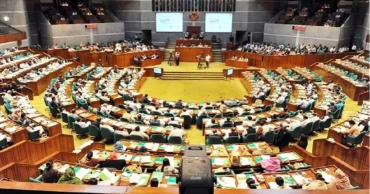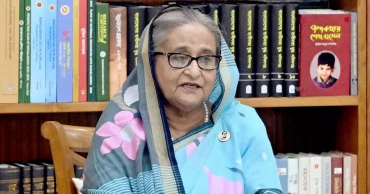food production
Public-private initiative needed to ensure production and supply of safe food
A combined effort of public-private partnership is needed in food production, inspection, and supply to the consumer level through trusted and committed entrepreneurs, a seminar on safe food was told on Thursday.
Speakers at the seminar said even when food is in a safe method, it is contaminated by use of harmful chemicals and preservatives during the process to supply to the consumers. Sometimes it is produced using unsafe chemicals and fertilizers, they said.
The seminar titled ‘'Strengthening smallholder farms and rural enterprises to better cope with climate change in the vulnerable haor regions of Bangladesh’ was held at the conference hall of Bangladesh Food Safety Authority (BSFA), in the capital on Thursday.
Bangladesh, Kuwait explore trade and food security ties
Dr. Md. Nazim Uddin, senior scientific officer of Bangladesh Agricultural Research Institute who is in charge of Bangladesh Organic Agriculture Network, in a keynote presentation highlighted different steps of safe food production, supply, and farm management.
Chairman of BFSA Zakaria noting some limitations said, “Mymensingh is home to 60 lakh people. There is only one food safety officer there. Now it is difficult to ensure food safety for so many people with just one person. And such a situation prevails everywhere.”
He said it is important for those involved in food production to have appropriate knowledge and training. To provide this training, BFSA is arranging online training. Those who need it can take training from here.
However, it is necessary to establish a training centre at the initiative of hotel owners to train hotel staff.
He said, “Education is needed for health safety. And a coordinated effort is needed to achieve this education. Our journey has started to ensure safe food, and this journey will continue.”
Director of the Department of Agricultural Extension Md. Shawkat Osman said, there is no alternative to organic fertilizers for safe food production.
Food Adviser calls for action against illegal food hoarding
However, it is not possible to produce sufficient agricultural products with organic fertilizers alone. Chemical fertilizers are needed. However, organic fertilizers can play a supporting role in this regard, he pointed out.
BSTI Director Md. Saiful Islam said that there is no alternative to social movements to increase food awareness. And political will is required for this social movement.
Because, “We are government employees, we have no power of our own. We have to do what is in the law,” he said mentioning limitation.
Fakir Muhammad Munawar Hossain, director of the National Consumer Rights Protection Department, said that to ensure safe food for consumers, it is necessary to ensure proper implementation of the law and increase social awareness.
“A social movement should be developed for social awareness to take safe food for the safety of health,” he pointed out.
CAB General Secretary Advocate Humayun Kabir Bhuiyan presided over the programme. The event was organized jointly by CAB and Friend In Village Development Bangladesh (FIVDB) with support of Welt Hunger Life.
1 year ago
Canada to increase potash exports to Bangladesh to boost food production, says country’s trade ministry
Canada is set to increase its potash exports to Bangladesh this year – aiming to strengthen food production and security in Bangladesh and support the country’s agricultural sector.
The agreement to increase the supply of potash was signed between the Canadian Commercial Corporation, Saskatchewan-based Canpotex (one of the world’s largest suppliers), and the government of Bangladesh, the Canadian Trade Ministry said in a statement released on March 17.
“The sale of Canadian potash to Bangladesh, made possible through the hard work of the Canadian Commercial Corporation, shows our commitment to being a reliable partner and quality supplier of agricultural products in the Indo-Pacific region. Canada is a global leader in helping to address challenges in global supply chains, all while promoting Canadian values and protecting good, middle-class Canadian jobs,” Mary Ng, Canadian Minister of International Trade, Export Promotion, Small Business and Economic Development, said while announcing the agreement.
Read More: Canada wants agro collaboration with Bangladesh, says visiting minister
The agreement – under the country’s new Indo-Pacific strategy – will help Bangladesh address the increased food insecurity caused by the Russia-Ukraine war, according to the Canadian trade ministry statement.
The Canadian Commercial Corporation has been supplying potash to Bangladesh since 2014. In 2022, Canada exported more than $500 million worth of potash to Bangladesh.
According to Bangladesh Fertilizer Association (BFA), Bangladesh imported 80% of its potash requirements from Russia and Belarus and about 20% from Canada in recent years. However, due to sanctions and payment-related complications since the Russia-Ukraine war broke out, Bangladesh is not able to import potash from Russia and Belarus.
Read More: BGMEA for Bangladesh mission's support for explore more trade opportunities in Canada
2 years ago
JS Affairs: 1.7 million child workers in country; No shortage of food production; 183 garment factories are green factories
There are some 1.7 million child workers in the country, and 1.2 million of them are engaged in hazardous work.
State Minister for Labour and Employment Begum Monnuzan Sufian said this in Parliament responding to a tabled question from Awami League MP Habib Hasan.
She said that according to a 2013 survey of the Bureau of Statistics the number of child workers in the country is 1.7 million.
Read more: Zakat Fund Management Bill passed in JS
She also said that as per the survey in 2003, the number of child workers was 3.4 million.
In response to another question of AL MP Abul Kalam Azad, Food Minister Sadhan Chandra Majumdar said that at present there is no food shortage in the country.
In the last fiscal year, 391.30 lakh metric tonnes of food grains including 380.48 lakh metric tonnes of rice and 10.82 lakh metric tons of wheat were produced.
The minister also claimed that there is no danger of food shortage in the country even in the current financial year.
Read more: Finance Minister places names of top 20 loan defaulters in JS
In response to another question from AL MP M Abdul Latif, Commerce Minister Tipu Munshi said that currently 183 garment factories in Bangladesh have been recognised as green factories from the US Green Building Council (USGBC).
3 years ago
Boost food production to avert any crisis: PM Hasina
Prime Minister Sheikh Hasina on Monday reiterated her call to increase food production to save the country from any possible trouble amid the global economic recession due to the Covid-19 pandemic and Russia-Ukraine war.
“We have to increase our production and preserve those so that our country must not plunge into any danger,” she said.
The premier was speaking at the programme marking the 25th founding anniversary of the Bangabandhu Sheikh Mujibur Rahman Agricultural University (BSMRAU) and inauguration of a Technology Exhibition.
The programme was held at the Begum Sufia Kamal Auditorium while the PM joined it virtually from her official residence Ganabhaban.
Hasina said that the world is witnessing an economic recession as an impact of coronavirus and war-related sanctions and counter-sanctions by the US-led Western block and Russia.
Read: PM Hasina wonders how leftists could join hands with BNP and Jamaat
“As a result the prices of food items have soared beyond the purchasing capacity of all. Besides, prices of everything including power, fuel and transportation have been increased,” she said.
Talking about the preservation capacity, she said that the government has set up a number of modern silos to stock rice.
“Such godowns are urgently needed for food items being produced here,” she said.
She also said that the government is focusing on the food processing industries in the 100 economic zones that are being set up in different parts of the country by the government.
Liberation War Affairs Minister AKM Mozammel Huq, Education Minister Dipu Moni, Deputy Minister for Education Mohibul Hassan Chowdhoury and Bangabandhu Sheikh Mujibur Rahman Agricultural University Vice-Chancellor Professor Dr. Md. Giashuddin Miah also spoke.
A documentary on the university was also screened at the programme.
Located at Salna, Gazipur, BSMRAU was established in 1998 as the country’s 13th state-run public university by an ordinance promulgated by the government of Bangladesh.
The prime minister also put emphasis on research on food products to ensure food security in the country.
She asked the authorities concerned along with involved persons to concentrate on producing more oil seeds in the country to reduce the dependency on others.
She said that Bangladesh imports 98 percent of the edible oil it consumes.
“But the mustard oil is the best for health. It can be upgraded through refining. We can do that,” she said.
In this connection she said that there were various types of edible oil seeds in the country.
“We must not be dependent on others. Why will we import from outside. We have to put more attention and do more research on edible oil production from various types of seeds. We have to take initiatives for that,” she said.
The PM said that to save the arable lands of the country the government is setting up 100 economic zones across the country.
She criticised those who during their regimes did not think about saving the arable lands.
She said many arable lands were destroyed through indiscriminate urbanisation, establishment of mills and factories alongside construction of houses.
“We do not want to lose our arable lands anymore. We have taken stern action regarding this,” she said.
She said that the government has put emphasis on research on jute and jute made items to make it more diversified to earn foreign exchange.
Read: Not that easy to overthrow AL govt through movement: PM
“Jute can be a very important addition to our export basket, we have to put more attention to this item,” she said.
The PM briefly described various steps of the government to improve the agricultural production and thanked the researchers for their utmost sincerity for inventing new varieties.
Liberation War Affairs Minister AKM Mozammel Huq, Education Minister Dipu Moni, Deputy Minister for Education Mohibul Hassan Chowdhoury and Bangabandhu Sheikh Mujibur Rahman Agricultural University Vice-Chancellor Professor Dr. Md. Giashuddin Miah also spoke.
A documentary on the university was also screened at the programme.
Located at Salna, Gazipur, BSMRAU was established in 1998 as the country’s 13th state-run public university by an ordinance promulgated by the government of Bangladesh.
3 years ago
Bangladesh Bank forms Tk 5000cr refinance scheme to ensure food security
Bangladesh Bank has formed a refinance scheme of Tk 5000 crore to boost food production and strengthen the country's food security.
Farmers can take loans from this fund at a 4 percent interest rate. They can borrow from this fund for a maximum of 18 months with a grace period of three months.
Bangladesh Bank issued a circular in this regard on Thursday and sent it to top executives of all banks. Farmers can take loans from this fund for crop cultivation, fish, poultry, dairy, vegetables, fruits, and flower firming.
The central bank believes that there is risk of a global food crisis due to the disruption in supply chain and prices of food grains are increasing for this reason.
In such a situation, to ensure the food security of the country, it is necessary to increase production.
Read: No forex crisis from Jan 2023, Bangladesh Bank Gov says
To this end, the central bank has decided to create a refinancing fund of Tk 5000 crore to maintain the flow of loans at low interest in the agricultural sector.
The circular stated that only farmers will get loans from this fund. Small marginal farmers can take a single collateral-free loan up to a maximum of Tk 2 lakh for the cultivation of crops including rice, vegetables, fruits and flowers.
According to the agricultural and rural loan policies of Bangladesh Bank, loans can be disbursed only against the related crop liability in the case of cultivation on a maximum of five acres of land.
Besides, banks can provide loans if it wishes by taking collateral on the basis of the customer-banker relationship.
Read: Bangladesh Bank curtails banks’ power to waive interest on loans
The loan money from this fund cannot be used to adjust the customer's old loan. Loan defaulters will also not get loans from this fund, the circular stated.
The duration of this loan disbursement is set to June 30, 2024, which would be increased if necessary.
3 years ago
Grow more food, keep enough stock to avert any crisis: PM Hasina
Prime Minister Sheikh Hasina on Monday reiterated her directives to relevant authorities to redouble their efforts to raise food production and maintain a stock of sufficient foods amid looming global crisis in 2023.
She made the call while presiding over the weekly Cabinet meeting at her office, according to a media briefing by Cabinet Secretary Khandker Anwarul Islam at the Secretariat.
“The first and foremost task is that we all will have to make frantic efforts to raise food production. We’ve also prospects here,” Khandker Anwarul quoted the premier as saying.
In the meeting, a FY 2021-22 report on ministries and divisions was placed and the Cabinet asked to take a number of initiatives to face any possible food crisis.
The Cabinet gave an observation to increase food productions at any cost, said Anwarul Islam.
“Our food storage is in a very comfortable situation. It will have to be kept in a comfortable position always,” he said, adding that the private sector has already permitted to import 15 lakh metric tons of foods.
The Cabinet asked to avoid the import of foods, particularly supplementary items from third parties as much as possible.
Read: Shun luxury and serve the people: PM Hasina tells elected Zila Parishads
Besides, the Cabinet asked the authorities concerned for taking steps to raise remittance inflow and FDI, as well as not to send unskilled workers to overseas labour markets without training them as per demands of job markets.
Meanwhile, the Cabinet in principle approved the draft of Bangladesh Dairy Development Board Act, 2022 in order to ensure quality dairy milks.
As per the draft law, technical support and cooling storage facilities would be provided to the farmers for proper preservation or improved feeds for the animals.
The meeting gave the final nod to the draft of Zoo Act, 2022, which was placed in a bid to ensure proper management of zoos and protection of wild animals there.
Meanwhile, the Cabinet endorsed the draft of an agreement to complete immigration procedures of hajj pilgrims in Bangladesh instead of Saudi Arabia.
As per the agreement titled “Cooperation Agreement on the Entry of Hajj Pilgrims,” the immigration procedures of Bangladesh hajj pilgrims would be completed here in Bangladesh regularly from now, said the Cabinet secretary.
“The immigration procedures of Bangladesh hajj pilgrims were completed here last year due to Covid-19 pandemic. This time two sides have signed an agreement to complete the procedures here from now. It is a great achievement,” he said.
Read: PM on forex reserves: Better to spend on people's welfare than keep it idle
The Cabinet also cleared the drafts of three agreements to be signed with Japan, Qatar and Saudi Arabia.
The deals are “Agreement on Cooperation and Mutual Assistance in Customs Matter” to be signed between Bangladesh and Japan, and “Agreement on Abolishing Visa Requirements for the Holders of Diplomatic, Special and Official Passports between the Government of the People’s Republic of Bangladesh and the Government of the State of Qatar,” and “Security Cooperation Agreement between the Government of Kingdom of Saudi Arabia and the government of the People’s Republic of Bangladesh.”
The agreement with Japan would be signed when PM Hasina would go on a visit to Japan at the end of this month, said the Cabinet secretary, adding that this deal would enhance bilateral trade and strengthen institutional communication.
3 years ago
Do your best to boost food production to keep Bangladesh free from famine: PM Hasina urges youth
Prime Minister Sheikh Hasina on Tuesday urged the youth to make greater efforts at boosting food and agricultural production to keep Bangladesh free from any worldwide famine and economic recession.
“I would like to call upon our youth to take more initiatives for the production and processing of food items in their respective areas. If so, we'll be able to fulfill the local demand and also help other famine-hit countries,” she said.
The premier was addressing the inauguration of the National Youth Day-2022 and the ceremony of National Youth Award-2022 at Osmani Memorial Auditorium through a virtual platform from her official residence Ganabhaban.
She said different international organisations predicted that the worldwide famine might hit and many developed countries are also facing economic recession now.
“To keep Bangladesh free from it (the brunt of any global famine and economic recession), every inch of our land should be cultivated. Besides, more steps should be taken to produce food items and processed food,” said Hasina.
Read more: PM urges all to keep their houses clean to prevent dengue
Noting that the youth is a very powerful force in Bangladesh, she said the soil of Bangladesh is very fertile and its biggest power is manpower. “We need to utilize this power,” she added.
Zakir Hossain from Noakhali Sadar (1st position), Suraiya Farhana Reshma (2nd) from Sherpur of Bogura and Billal Miah (3rd) from Araihazar of Narayanganj received the National Youth Award under the successful self-employment category, while Rita Jasmine from Barishal Sadar (1st) and Abu Russell Huda (2nd) from Birol of Dinajpur received the award under the best youth organizer category.
Besides, successful self-employed youths and youth organisers received the award under divisional quota.
On behalf of the PM, State Minister for Youth and Sports Zahid Ahsan Russel handed over the award to the recipients. Every award winner was conferred with a crest, a certificate and a cheque of award money.
Youth and Sports Secretary Mesbah Uddin, and two award recipients Zakir Hossain and Rita Jasmine spoke on the occasion.
Read more: Sajeda Chowdhury’s death is a great loss, PM tells JS
The prime minister said the country’s young people and students will have to keep pace with new technology and new inventions in science in the world. “We want to develop our youth as trained and skilled manpower making it fit for the 4th industrial revolution,” she added.
She said her government has been establishing different institutions including, hi-tech parks, software parks, IT training and incubation centres, specialized labs and union digital centres so that the youths can get training there.
“I believe that our youth are very talented and they would be able to show their competence in every job,” she added.
Pointing to the young generation, Hasina said Father of the Nation Bangabandhu Sheikh Mujibur Rahman had presented a country for the nation and the country will have to be developed in the line with the spirit of the Liberation War.
She said the youths who established themselves with self-employment have been keeping a huge contribution to the country’s economic progress.
The PM said her government, coming to power in 1996, put emphasis on science, technical and vocational education and took different training programmes to develop the young generation.
She said her government opened different sectors including television channels, radio, banks and insurances for the private entrepreneurs in a bid to create employment. So, the people now get its benefits, she added.
The premier said the government is creating employment opportunities and generating jobs for the young generation.
Read more: Bangladesh Navy deserves appreciation for ensuring maritime security while facing natural challenges: PM
She said a process is on to prepare a database of the country trained youths. “If once the database is prepared, we can know who are employed or who are still unemployed and take step for creating job opportunities for the unemployed youths,” she added.
PM Hasina said the government enacted the Youth Welfare Fund Act, 2016 and provided Tk 27.77 lakh as project-based donation to 14,668 youth organisations from the fund.
3 years ago
‘Seeing signs of looming global food crisis, Bangladesh must be protected’
Prime Minister Sheikh Hasina today renewed her call to increase food production and to utilize uncultivated land for farming – to protect Bangladesh from the looming global food crisis.
“We must stop wasting food, and produce our own food… If we all work together, Bangladesh will not face the impact (of the global food crisis). It’s my firm belief,” she said.
The premier was addressing a programme arranged at Dhaka’s Osmani Memorial Auditorium on the occasion of World Food Day 2022. She joined the event through a virtual platform from her official residence Ganobhaban.
“I would like to request all not to waste any food, and increase food production. Cultivate whatever land you possess. We’re seeing signs of an impending global food crisis. We must protect Bangladesh from this looming disaster,” she said.
She said her government has been working to ensure nutritious, balanced and safe foods in Bangladesh. Since the demand for such food is growing in the world, Bangladesh can be benefited through raising production, she said.
Read: Grow more food, save money to avert famine in Bangladesh: PM Hasina
This year, World Food Day was observed with the theme “Leave No One behind. Better production, better nutrition, a better environment, and a better life,” across the world on Sunday (October 16).
In order to ensure safe food, the prime minister said, the government has already allocated 5 acres of land in Purbachal – on the outskirts of Dhaka – for setting up the head office of Safe Food Authority, a central laboratory, and a divisional laboratory.
She said the government also has plans to set up eight reference laboratories in eight divisions. Besides, a Safe Food Authority hotline has been launched, she added.
With an objective to boost the export of agricultural products, work on formulation of ‘Good Agriculture Practice’ is going on, said the prime minister.
Noting that the government is putting importance on the agro-processing industry, she asked all to take steps for development of the industry, to boost export of processed goods alongside meeting local demands.
She said the Russia-Ukraine war, sanctions and counter-sanctions made the transportation cost of fertilizer and food very high. Many developed countries are also struggling to face the crisis, she said.
Read: Save money, produce food to face tough days ahead: PM
The PM said now the researchers are developing many salinity-tolerant, drought-tolerant, flood-tolerant and high-yielding crop varieties and different technologies in the agriculture sector. “We’re now seeing results from the agro-research which are being conducted,” she said.
Sheikh Hasina said once there were many fallow lands in the country, but her government has been able to bring some 80,000 hectares of fallow land under cultivation.
She said her government provided agricultural input assistance cards to about two crore farmers. Now, farmers can receive subsidy directly by opening a bank account at the cost of Tk 10.
To exchange information with the farmers, the government has set up different channels including Krishi Batayan, Krishak Bandhu Phone Sheba (3331), Krishak Janala and Krishi Call Center (16123) in line with her announcement made in the 2008 election manifesto to turn the country into ‘Digital Bangladesh’.
She said the government is putting emphasis on agricultural mechanization and the use of technology in every sector keeping the 4th industrial revolution in mind.
She said the government is working on six thematic areas to achieve agriculture, food and nutrition security. The six areas are: agricultural research and development; supply of agricultural inputs; agricultural extension; efficient use of water for irrigation purposes; addressing the impacts of climate change; and institutional capacity building and human resource development, she noted.
Presided over by Food Minister Sadhan Chandra Majumder, the function was addressed by Fisheries and Livestock Minister SM Rezaul Karim, Chairman of the Parliamentary Standing Committee on Agriculture Ministry Matia Chowdhury and Agriculture Secretary Sayedul Islam.
3 years ago
Work for more food production amid looming crisis, PM Hasina urges BCL members
Prime Minister Sheikh Hasina on Wednesday asked Bangladesh Chhatra League (BCL), the student wing of her ruling Awami League, to work for boosting food production in the country as the world might face a deeper food crisis.
“If needed, our Chhatra League will have to help farmers plant paddy seedlings as they did in harvesting paddy (during the Covid-19 period),” she said.
The premier was addressing a discussion organised by BCL at Bangabandhu International Conference Centre here to mark the National Mourning Day of August 15, the day the country’s architect Bangabandhu Sheikh Mujibur Rahman was assassinated along with most members of his family in 1975.
Hasina, also the AL president, asked every BCL member to plant trees massively besides cultivating crops and thus increase food production in respective village home and the place of living – it may be a hostel or educational institute.
This is needed as the world might witness a dire situation and the foods might not be purchased despite having money. “So, we will have to produce our own foods,” she added.
The PM also asked the BCL members to exercise austerity in the use of electricity, water and fuels amid the world economic crisis.
She urged the BCL members to build them as worthy citizens by attaining proper education. “I want skilled human resources and that is why I’ve established lots of universities to meet the demand as it is time for science and technology and 4IR,” she said.
Describing BCL as a large organisation, the prime minister said many outsiders infiltrated into it as Awami League has been in power for a long time. Infiltrators make trouble, but BCL is to bear its blame, she said.
Read: PM participates in extended discussion in JS on global roots of local suffering
Hasina asked the BCL leaders not to allow infiltration of bad guys into the organisation for strengthening their own groups. “If you do it, it will ultimately invite bad names for yourself, the organisation and the country,” she said.
“There is no word (criticism) about so many misdeeds Chhatra Dal did in the past. But if a trivial matter occurs in Chhatra League, big news stories are run,” she said, asking the BCL leaders to be careful of its image.
The PM urged the BCL leaders to be imbued with patriotism, non-communal spirit and the ideology of the Liberation War in order to acquire true leadership quality for leading the country rightly in future.
Noting that there is no use of money and assets in many cases, she said, “If anyone can go above personal desire and gain, he or she would be able to develop him or her as a true leader.”
About the August 15 carnage, Hasina said her father Bangabandhu Sheikh Mujib could never believe that any Bengali could kill him. He had brought the independence of the country and always lead a very simple life despite being the president and the prime minister of this country, she said.
Recalling the contribution of Bangamata Sheikh Fazilatunnesa to the struggle for freedom, Hasina said her mother used to take care of not only her family but also the organisation when her father was in jail.
The PM said her mother had never bothered her father over the familial affairs. Bangamata had helped her husband make timely and right decisions regarding national life and the freedom struggle.
“The dedication of my mother is incomparable. My father was very lucky that my mother had no personal desire or never wanted anything for her personal interest,” she said.
The premier also unveiled BCL's two publications -"Matribhumi" and "Joy Bangla" at the event.
BCL president Al-Nahean Khan Joy presided over the function, moderated by its general secretary Lekhak Bhattacharjee.
3 years ago
BB relaxes agro credit payment schedule to boost food production
Bangladesh Bank (BB) has relaxed the conditions for rescheduling short-term agricultural credit to enhance food production and growing agro-based industry in the country.
The move came in the recent global economic context, increase in the prices of various agricultural inputs in the international market and its transportation cost, according to a central bank notification.
Also read: BB fixes 7 pc interest rates on deposit, 11 pc in lending for NBFIs
“Entrepreneurs in this sector need to bring more dynamism in their production activities to prevent the rise in prices of agricultural commodities in the domestic market,” it said.
As a result the BB asked banks to follow relaxed guidelines in rescheduling short-term agricultural loans to facilitate the repayment of loans to the entrepreneurs in the agricultural sector and to maintain normal credit flow.
Bakers can rearrange for a maximum period of 3 year with a grace period of 6 months from the date of rescheduling of short term agricultural loan by relaxing the condition of accepting down payment on the basis of customer relationship.
In some cases, such loans can be rescheduled without a down payment.
Also read:Despite central bank's green light, banks shy to invest in capital market
Besides, the certificate cases can be postponed or settled out of the court by negotiation with the customer and facilitate rescheduling also.
The aforesaid benefits will also apply to short-term agricultural loans rescheduled to whoever rescheduled loan earlier.
3 years ago


















